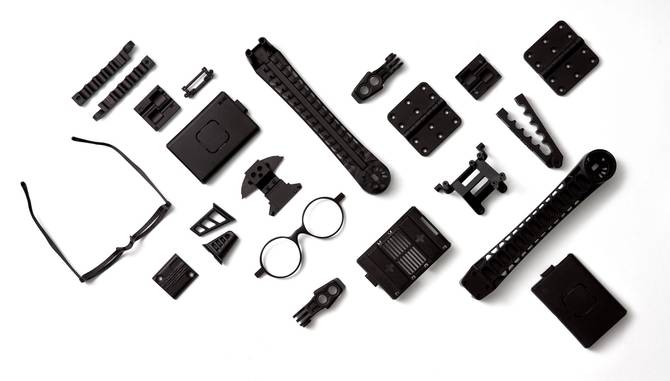Happy Wednesday. And thank you all for the submissions to our new, weekly reader spotlight section called Coworking. As of send time, we already have 161 submissions, but, what the hell? Let’s plug it again. As a reminder, we’ll roll out the section in November.
Click here for a chance to be featured in an upcoming version of this newsletter.
In today’s edition:
🏷 Molecular barcodes
 Metaverse ethics Metaverse ethics
🖨 3D-printing SPAC
—Dan McCarthy, Hayden Field, Jordan McDonald
|
|
|
Unsplash
High-end leather. Premium cotton. Fine wines.
These are some of the products that use Applied DNA’s “molecular barcode”—an inert, unique strand of synthetic DNA companies use to ensure their product isn’t tampered with throughout its journey from the producer to end consumer.
Since 2017...Cannabis has been on that list, too—and Applied DNA’s cannabis lead John Shearman told Emerging Tech Brew interest from cultivators and potential government and law-enforcement clients is heating up as the now $17.5 billion legal cannabis industry matures in the US.
- In mid–September, the company signed its newest cannabis partner, Flora Growth, an all-outdoor, publicly traded, Colombia–based grower that expects to earn $9 million– $11 million in the second half of 2021.
- Shearman declined to tell us how many active cannabis clients it has, and it hasn’t publicly disclosed any other than Flora.
“The [CertainT] platform is being used across many, many industries—cannabis is new, but there is a great deal of interest into it,” Shearman said, because it can help with things like the “regulatory side, the raw materials’ traceability, product authentication, counterfeit diversion, consumer safety in general.”
How it works: A client, like Flora Growth, applies its unique DNA solution to the thing it wants to track—like cannabis plants, post-harvest. From there, Flora and its supply-chain partners will use Applied DNA’s PCR tests to evaluate a tiny sample of the cannabis product and verify that it comes from a Flora farm.
- CertainT’s commercial life kicked off with a 2013 DOD contract to authenticate the semiconductors that go into weapons systems, Shearman told us.
- Now, its unique molecular identifiers “exist on hundreds of millions of commodity goods ranging from consumer product packaging to microcircuits to cotton and synthetic fibers,” per company filings.
The product has a “generally recognized as safe” (GRAS) distinction from a third-party consultant called Ramboll, though it is not FDA approved. It’s not considered a genetically modified organism (GMO). This was key for Flora, per the company’s chief revenue officer Jason Warnock, because it both needs to ensure that additives are safe and don’t jeopardize its organic status.
But, but, but...Molecular tagging like CertainT has previously received pushback in the cannabis space, both for its potential application by law-enforcement agencies and because it’s an additive. In 2018, a Colorado state senator introduced a bill that would have required the use of molecular tagging like Applied DNA’s CertainT product, which ultimately failed.
“The thought of it alone—whether it’s safe or not—just the thought of an additive when we are trying to reduce additives is a turn-off to me,” Larisa Bolivar, executive director of the Colorado-based Cannabis Consumers Coalition told Cannabis Now in 2018, in reference to molecular-tagging products. “It is unnecessary. I personally will not consume cannabis that has additives on it.”
Click here to read more.—DM
|
|
|
Francis Scialabba
Facebook has been vocal about its desire to become a metaverse company. Now, it wants us to know it’s doing it…“responsibly.”
This week, the company announced a $50 million fund dedicated to creating products and services for the metaverse—defined as virtual spaces to connect with others—with inclusivity, safety, and privacy in mind.
- Think of it as akin to an AI ethics push, but for the metaverse.
The plan: The XR Programs and Research Fund will aim to invest the money into programs and independent research over the next two years, partnering with organizations like Women in Immersive Tech and Africa No Filter, and funding research at academic institutions like the University of Hong Kong and National University of Singapore.
Big picture: To Facebook, $50 million is a drop in the bucket—on average, it’s about what the company made every four hours last quarter. This isn’t the first time Facebook has publicized its responsible tech efforts, either: Amid past controversies, like Cambridge Analytica and the FTC lawsuit, it also pledged $$ to AI ethics and data-privacy research, but it hasn't kept the company out of hot water with lawmakers and the public.—HF
|
|
|
|
No longer is futuristic technology just for those of us with aspirations to put a hotel on the moon or drive a car that’s also a submarine.
In fact, most of the smartest tech around is being implemented in consumer products you’d find under the sink, in the garage, or cleaning the floor.
In our latest article, we’re discussing how smart thinking like LiDAR mapping, AI learning, and ultrasonic tech can make your home life a whole lot better.
This tech is showing up in some surprising places, which means some products that have been around for ages are now officially “smart.”
So take a look at our article and prepare to be floored by all of the upgrades in the consumer tech space.
Check it out here.
|
|
|
Pictured: 3D-printed items from Shapeways; source: Shapeways
Shapeways, a NYC–based 3D-printing company, is set to go public via SPAC on Thursday. Its expected valuation is $605 million, and it has raised $107.5 million since its founding back in 2007.
Why this matters: Shapeways and other 3D-printing-based manufacturers are unique compared to traditional industrial manufacturers, which rely on mass production via cast molds and fixed specifications; 3D-printing allows manufacturers to use only the materials needed to make a given part or product, granting flexibility to make changes to product molds.
- But 3D printers can’t produce at the same scale or speed as traditional methods, making them more of a complement than replacement.
“Customers use us to upload a digital file and get physical production completed within days,” Shapeways CEO Greg Kress told Emerging Tech Brew. “We work directly with those engineers, whether they’re in large companies or individual engineers or consulting firms, they use Shapeways for transitioning that digital design into the physical product.”
Kress said Shapeways provides access to 11 different hardware technologies, including 3D printing and injection molding, 90 different materials and finishes, like plastics and precious metals, and has produced more than 21 million individual parts, from knee braces to auto parts. Kress said the company is focused on four areas as it grows:
- Expanding its manufacturing capabilities, including new hardware tech and new materials and finishes.
- Building out its go-to-market strategy.
- Offering additional and traditional services like injection molding and sheet-metal casting through outsourced supply chain partners.
- Monetizing and licensing its 3D-printing software.
Zoom out: Desktop Metal, which builds and sells 3D printers to heavy industry companies like Volkswagen and Georgia-Pacific, also SPAC’d, in December 2020, at a $2.5 billion valuation.—JM
|
|
|
|
No barriers, just business. Intelligent ERP from SAP enables interconnectivity and visibility across your entire organization. That means you can break down the traditional silos of sales, marketing, HR, finance, and procurement to start working together in different—and innovative—ways. Learn how you can do business smarter with SAP today.
|
|
|
Pictured: Ford's forthcoming F-150 Lightning; source: Ford
Stat: Ford unveiled an $11.4 billion plan to build three EV battery factories and an electric truck assembly plant in partnership with South Korean battery-maker SK innovation.
Quote: "Do remember that there are a lot of people that want Tesla to fail; Don’t let them mischaracterize your feedback and media posts.”—language from the NDA Tesla reportedly makes “Full Self Driving” beta testers sign
Read: How Twitter decided to open its image-cropping algorithm up to external researchers.
This adds up: Multiple deadlines + pressure for accuracy = stressed accountants. That’s why FloQast’s software was built to help accounting teams operate more efficiently. As former accountants themselves, they've developed a few ways to help you decompress after closing the books. Learn more here.*
Use your thumbs: Manage your digital assets (like Bitcoin, rewards points, gift cards, and cash) in one convenient, tidy place with the Bakkt® App. Unlock the value of your assets and get started today.*
*This is sponsored advertising content
|
|
-
The FCC will begin its $1.9 billion, ZTE- and Huawei-focused rip-and-replace program in October. The plan will reimburse telcos using equipment from the embattled Chinese companies.
-
Bitcoin miners are striking deals with nuclear power plants, as well as gas plants and idle coal mines.
-
Amazon debuted a new Halo wearable, GE-powered smart-home hub, a $999 home robot called Astro, and more, in its hardware event yesterday. (Vice immediately lifted the veil on Astro).
-
Amazon also opened up the invite period for the $250 in-home drone it announced at last year’s fall hardware event.
-
The FDA cleared a cancer-diagnosis AI system for the first time ever.
|
|
A biweekly tech trivia challenge.
Ford announced an $11.4 billion EV push this week, with batteries at the fore. How well do you know the heartbeat of EVs?
Click here to take the quiz
|
|
Updates on the world of cutting-edge tech research.
Two tech researchers won MacArthur “Genius” grants yesterday, which gives 25 winners $625,000 and a whole lot of clout each year.
Here’s a quick spotlight of their work.
-
Safiya Noble: In 2018, Noble, a UCLA professor, wrote a book called Algorithms of Oppression: How Search Engines Reinforce Racism. The work demonstrated that racial and gender biases can be baked into seemingly neutral tech like search algorithms—an unfortunate reality that has reared its head time and again in automated systems.
-
Joshua Miele: Miele, who works at Amazon, designs adaptive technology for blind and visually impaired people. At Amazon, he’s worked on projects like making Fire tablets Braille-compatible, and he’s also helped make tactile maps more readily accessible via a software program called Tactile Maps Automated Production.
|
|
Catch up on the top Emerging Tech Brew stories from the past few editions:
|
|
|
Enjoying the newsletter? Share it with your network to take advantage of our rewards program.
When you reach 3 referrals, you'll be invited to Monthly Exclusive Events with our co-founder Alex and the biggest names in business.

Hit the button below to learn more and access your rewards hub.
Click to ShareOr copy & paste your referral link to others:
morningbrew.com/emerging-tech/r/?kid=303a04a9
|
|
|
Written by
Dan McCarthy, Hayden Field, and Jordan McDonald
Was this email forwarded to you? Sign up
here.
|
ADVERTISE
//
CAREERS
//
SHOP
//
FAQ
Update your email preferences or unsubscribe
here.
View our privacy policy
here.
Copyright ©
2021
Morning Brew. All rights reserved.
22 W 19th St, 8th Floor, New York, NY 10011
|
|










